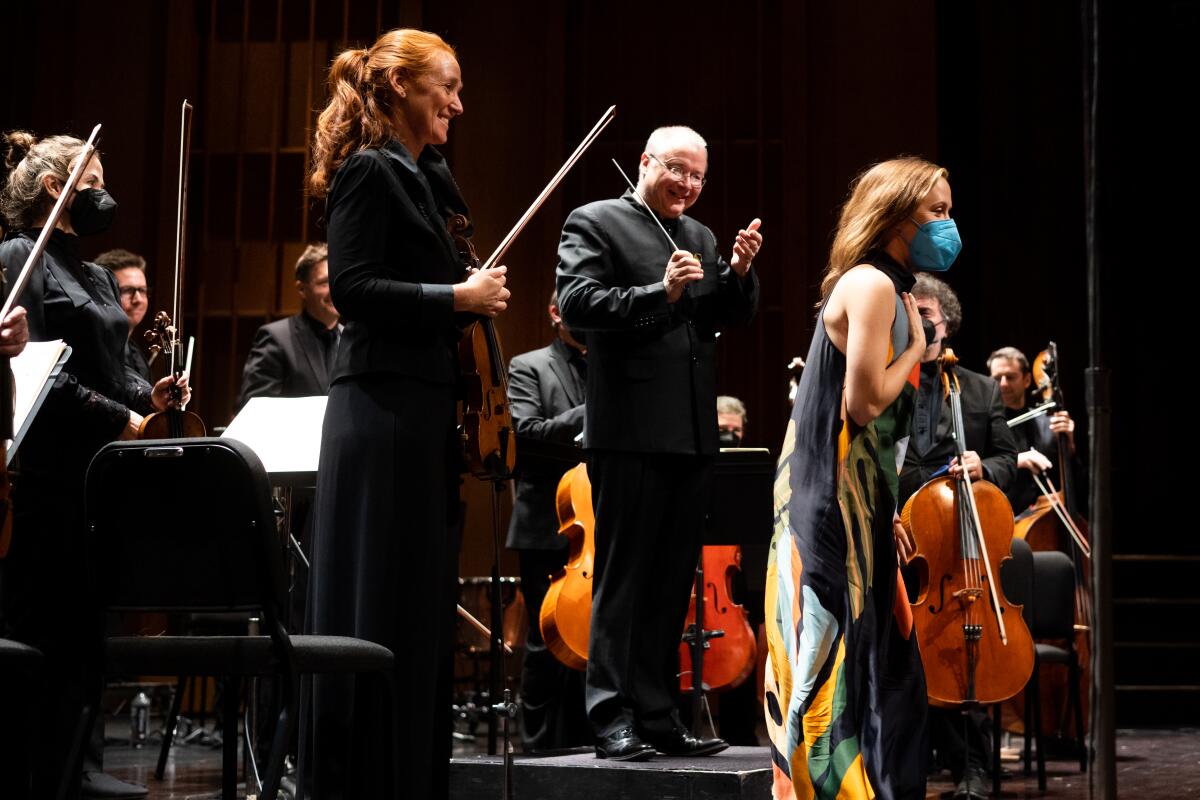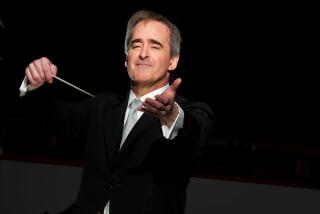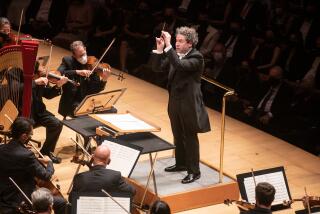Review: The environmental impact of composers Ellen Reid and Gabriela Ortiz, indoors and out

The plan was this: An only-in-L.A. Sunday promised two major environmentally themed premieres by two celebrated composers who have long and special associations with the town’s two most prominent orchestras, along with a soundwalk thrown in for good environmental measure.
In the afternoon at Walt Disney Concert Hall, Gustavo Dudamel was finishing his exceptional Los Angeles Philharmonic cycle of early Stravinsky ballets paired with Latin American music. This time, Stravinsky’s “Firebird” would be preceded by Gabriela Ortiz’s “Altar de Cuerda,” a new 33-minute violin concerto featuring the debut of a 19-year-old Spanish violinist, María Dueñas, that everyone is talking about.
That evening at UCLA, the Los Angeles Chamber Orchestra was set to conclude the first full season of its popular Spanish music director, Jaime Martín, with the premiere of Ellen Reid’s “Floodplain.” If you brought along a pair of earbuds, Ellen Reid’s ongoing UCLA soundwalk offered a perfect prelude.
“Floodplain,” commissioned for the end of the 2019-20 season, fell victim to pandemic cancellations, which meant, Reid told the audience, that she put off writing the score for two years. By that time, her sense of what “a lush and incredibly dangerous floodplain” might represent had “totally changed.” Unpredictability led, she said, to a very different score than originally planned.
That’s the environment for you. I don’t know whether she made those remarks before the Sunday performance. On learning that UCLA had unpredictably dropped its vaccination and mask requirements for Royce Hall, I changed my plan and attended LACO’s Saturday night concert at Ambassador Auditorium in Pasadena, where the requirements remained intact.
The university had lifted its mandates just in time to mark the one-year anniversary of L.A.’s first live concert for an audience since COVID-19 closures began. On that very day of LACO’s Royce date a year ago, Dudamel and the L.A. had given a special “Welcome Back” concert at the Hollywood Bowl for first responders like those in the extensive UCLA Health network that many of us rely on. The Bowl audience was distanced and masked. Infections in L.A. were at the low 200s and falling. On Sunday at the newly mask-optional Royce, and with L.A. Public Health Director Barbara Ferrer now urgently recommending indoor mask use, infections in L.A. were at least 10 times higher and rapidly rising.
The warnings came as no surprise to LACO. The orchestra found itself in the position of having to offer refunds to patrons not willing to risk Royce, as well as needing a last-minute replacement for Martín, home in London with COVID-19 and unable to finish out his first full season after all.
Yet in an incredibly lucky instance of unpredictability, LACO was able to engage the outstanding new music specialist, Stefan Asbury, who quickly mastered Reid’s score. He also retained the original program, which showcased two rhapsodic principal players, violinist Margaret Batjer and cellist Andrew Shulman in Brahms’ Double Concerto and ended in Beethovenian triumph with the Fifth Symphony.
I wound up trying the UCLA soundwalk on Friday, on an unpleasantly hot afternoon and in a bad mood. Soundwalks are strange. They can take you out of the environment and into your own personal world, while at the same time making you aware of your surroundings in ways you might not be otherwise.
I entered campus at the medical school, and Reid’s alluring strummed strings made me think what a slap in the face to its great medical institution this lax UCLA policy is. Gongs then guided me to the welcome repose of the campus’ botanical gardens, where medical students in scrubs were lingering.
The soundscape evolves with its own inevitable unpredictability. Heading past Royce and distractedly chilling to an electronic drone, I nearly collided with a creepy, if cute, robot rolling by that read: “I deliver to Bruins.” The score reached a warm climax, then cut off, as if with dramatic purpose, just before I reached the Ronald Reagan hospital, where they are presumably preparing for an increase in COVID-19 patients.
“Floodplain,” which lasts 17 minutes, comes upon you with its own environmental urgency. Floodplains themselves happen to be unpredictable ecosystems, formed by meandering rivers, filling and emptying in their own fickle ways. They create nutrient-rich soil and, like so many of our activities in the land we occupy, are threatened by treacherous environmental and health-oblivious policy (UCLA has plentiful company).
How to convey this in music? In an earlier piece, “Petrichor,” Reid — LACO’s composer in residence — evoked that longed-for-in-L.A. scent of earthy moisture that pervades the atmosphere after the first rain following a drought. For that, Reid persuasively pervaded the concert hall with shimmering sound.
In “Floodplain,” the orchestra heaves and releases, like a river of sound overflowing its banks and then evaporating. Tremolos are everywhere, in luxuriant strings and piquant winds and skittering percussion. Richly expressive solo passages for violin and cello might be heard as the living creatures on the scene — probably not human, though, as they are too absorbed into the texture to seem like outsiders. Incandescent melodies, or hints thereof, emerge only at the end, hinting at floodplains harmonized into the environment.
At the L.A. Phil on Sunday, Ortiz also listened to the harmonies of the environment, as she has been doing in her nearly two-decade relationship with the orchestra. That began with Esa-Pekka Salonen giving the premiere of her 2002 “Altar de Piedra” (Altar of Stone), a vibrant concerto for three percussionists and orchestra. The latest in her “Altar” series, “Altar de Cuerda,” is now her sixth commission from the orchestra. Her fifth, “Kauyumari,” spectacularly opened the L.A. Phil’s “Homecoming” gala, celebrating the return to Disney after 19 pandemic months away.
For Ortiz, an “altar” is an environmental construct, a veneration of our place in the world we inhabit. “Cuerda” is the altar of strings and was written for Dueñas. The concerto consists of three movements, each an idealized altar. The first is “Morisco Chilango,” which stands for a Moorish Mexico City native, and begins, as does Reid, in a state of shimmering strings, but is cut through with startlingly sharp percussive attacks and exciting rhythmic action of a city coming to life.
The beautiful, bass-heavy central movement, “Canto Abierto” (Open Song), conjures a mystical atmosphere of early Mexican churches. A bass drum booms, deep strings give mildewy cushion and timpani glide down as if to the center of the Earth. Wind instruments are the wind. The glistening solo violin does the singing. A final chord in the orchestra sounds electrically charged.
“Maya Déco,” a bravura Mayan decoration with a dazzling cadenza, became a showpiece for Dueñas. As a matter of principle, I try to keep teenage musicians out of our coverage, and that goes especially for the most gifted, as they deserve the privilege of growing as artists without outside expectations.
That is impossible here. It is impossible because “Cuerda” was dedicated to Dueñas but more so because she is already an exceptional musician. Poised and unshowy, she owns this exceedingly difficult concerto. Her tone is slender but so purposefully focused that it easily carries. You can tell that it is purposeful, because when Ortiz asks for a plum-rich, vibrating expressiveness, she manages that brilliantly.
If you want to get an idea of Dueñas, who has been named a BBC new generation artist, the British radio service recently broadcast a performance of her playing Sibelius’ Violin Concerto in her debut with the Liverpool Philharmonic Orchestra shortly before flying to L.A., and it is archived for a month.
KUSC should eventually get around to broadcasting Sunday’s L.A. Phil performance, which ended with Dudamel fantastically engulfing Disney in the complete “Firebird” ballet score, that mythical little firebird becoming yet another enchanted force of nature. Masks, meanwhile, in Disney still stay on, sure to mitigate against a ruinous force of nature.
More to Read
The biggest entertainment stories
Get our big stories about Hollywood, film, television, music, arts, culture and more right in your inbox as soon as they publish.
You may occasionally receive promotional content from the Los Angeles Times.







